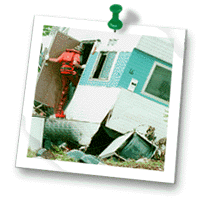The Science of Floods

Most of us have studied the "water cycle", or "hydrological system", in school. Water circulates from clouds to the soil to streams to rivers to the oceans and then returns to the clouds. When that system backs-up there is a flood.
A number of factors can contribute to that imbalance, including:
* heavy, intense rainfall
* run-off from a deep snow cover
* over-saturated soil, when the ground can't hold anymore water.
* frozen soil
* high river, stream or reservoir levels caused by unusually large amounts of rain
* ice jams in rivers
* urbanization, or lots of buildings and parking lots
However, human activity that changes the surface of the Earth also effects the water cycle, and can cause floods. Buildings, parking lots and roads, replace grass and dirt with concrete. Under normal circumstances, soil acts like a sponge and soaks up a fair portion of rainwater. But in crowded towns and cities, rainwater flows into storm sewers and drainage ditches, and, at times, overloads them. An urban area can be flooded by an amount of rainfall that would have had no impact in a rural area.

0 Comments:
Post a Comment
<< Home